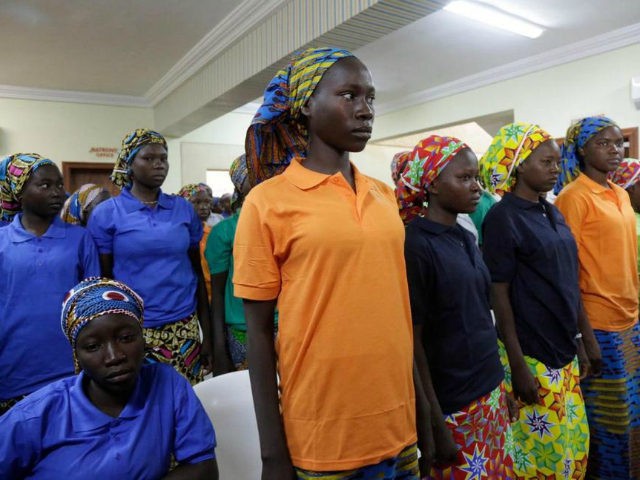Parents of the girls and young women kidnapped by Islamic State affiliate Boko Haram from Chibok, Nigeria, in 2014 are still waiting to see the 82 released as part of a trade with the terrorist group last weekend. The government claims it is still conducting physical and mental health evaluations, ensuring that none of the girls will pose a danger to society once freed.
Boko Haram has kidnapped thousands of girls and women, forcing them into marriages with terrorists and subjecting them to extreme sexual violence, slavery, and brainwashing. Many girls have executed suicide bombings at the command of Boko Haram terrorists, and many liberated still exhibit loyalty to the terrorist group after living among them for years.
The parents of the Chibok girls released this weekend tell the Agence France-Presse that they are patiently waiting for word from the government to travel to Abuja, the nation’s capital, and see their children.
“This may take some time, as the girls are now undergoing medical and mental evaluation to ensure they are in the best of condition,” Yakubu Nkeki, head of the Abducted Chibok Girls Parents’ group, told AFP. “We don’t mind waiting. … Their health and wellbeing is paramount to us and such evaluation takes time, especially with such a huge number of girls.”
The Nigerian newspaper Vanguard reports that only one parent has had contact with his child in the most recently liberated group. “Only one parent, a father, Mr Bulus Yehi, who stays in Lagos has been able to speak with [his] daughter on telephone,” Hosea Tsambido, a leader among the Chibok community in Abuja, told the newspaper.
Fear that the girls may be brainwashed and execute terrorist attacks on behalf of Boko Haram once liberated – or suffer trauma requiring extended medical attention they would not have access to in northern Nigeria – was exacerbated by the case of the 83rd girl set to be released as part of the Nigerian government’s deal with the terrorist group. One girl, whom the government did not identify, refused to leave the group.
“One said, ‘No, I have a husband. I’m happy where I am.’ And then 82 came back,” Nigerian presidential spokesman Garba Shehu said in a television interview.
Another concern is that the girls may be misidentified, resulting in parents traveling more than 500 miles from Chibok to Abuja only to meet with strangers instead of their daughters. The government has highlighted this as a particular concern and sent photos of all the released girls to Chibok to confirm their identities with the families of the missing. “Some parents were airlifted from Chibok and brought to Abuja only for them to discover that it wasn’t their daughters,” a spokesman for the parents, Allen Manasseh, told the Associated Press of the previous release of Chibok girls.
Even if their children are positively identified, some parents will not be able to afford the trip to Abuja to see their children. “I’m very anxious to meet her so I can celebrate with her and others that were freed, and also to pray for the remaining ones who are still missing so they can be rescued,” one parent, identified as Abana Ishaya, told the AP. He believes his daughter is among the 82 released. “I really want to see my daughter, but I can’t come unless with government invitation.”
The 82 girls were released as part of a prisoner swap with the terrorist group for five high-ranking Boko Haram terrorists, what the government called a “favorable bargain.” A government source who spoke to the Daily Trust repeatedly noted that “less than a dozen” terrorists were released in exchange for these girls, and that internal disputes within Boko Haram delayed the swap. Ultimately, the faction loyal to leader Abubakar Shekau won the debate on whether to take the deal, he said.
Remaining in Boko Haram captivity are 113 Chibok girls. The girls were kidnapped on April 14, 2014, as they conducted a physics test at the all-girls school in Chibok, Borno State. Boko Haram opposes education for women and has abducted thousands of women, forcing them to become slave wives and impregnating many. The government does not have estimates for the number of children born in Boko Haram captivity, most in the dense Sambisa Forest of northern Nigeria.
In 2015, the Nigerian government declared that they had “won the war” against Boko Haram, despite the group’s consistent suicide bombings, village raids, and other terrorist acts since then.

COMMENTS
Please let us know if you're having issues with commenting.